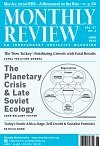Political Economy
The globalization of production and its shift to low-wage countries is the most significant and dynamic transformation of the neoliberal era. Its fundamental driving force is what some economists call “global labor arbitrage”: the efforts by firms in Europe, North America, and Japan to cut costs and boost profits by replacing higher-waged domestic labor with cheaper foreign labor, achieved either through emigration of production (“outsourcing,” as used here) or through immigration of workers. Reduction in tariffs and removal of barriers to capital flows have spurred the migration of production to low-wage countries, but militarization of borders and rising xenophobia have had the opposite effect on the migration of workers from these countries—not stopping it altogether, but inhibiting its flow and reinforcing migrants’ vulnerable, second-class status. | more…

In two Monthly Review special issues, “Education Under Fire: The U.S. Corporate Attack on Students, Teachers, and Schools” (July-August 2011) and “Public School Teachers Fighting Back” (June 2013), we sounded an alarm regarding the rapid restructuring and privatization of U.S. K–12 public schools. In terms of the scale of nationwide restructuring, the corporate takeover of education is unprecedented in modern U.S. history. The closest comparison we can come up with is the destruction of the street car systems across the United States and the building of the interstate highway system—in which freeways went right through cities for the first time, often in the face of neighborhood and community resistance. With respect to K–12 education, unimaginable amounts of private funds have gone into pressuring and corrupting government at every level, while the control mechanisms of the new educational system are increasingly left in private, not public, hands. The Common Core Standards and related high-stakes tests are at the center of this new system, and are the product of private corporate groups outside the direct reach of government. | more…
Turkey’s ruling party has turned the country, which it calls “the new Turkey,” into a capitalist nightmare: a triad of neoliberal economics, political despotism, and Islamist conservatism. This article provides an overview of neoliberalism in Turkey, then looks at the government’s extraction policies, highlighting the Soma mine massacre as one tragic example of the destructive policies of the governing party, the Adalet ve Kalkınma Partisi (AKP, Justice and Development Party). It also examines the extreme authoritarianism of President Recep Tayyip Erdoğan (formerly prime minister), and the growing cultural-relgious conservatism, which the AKP has interlaced with Islamist rhetoric. This hegemonic triad of neoliberalism, despotism, and conservatism is an especially dangerous one. However, it is being increasingly criticized, and resistance movements against neoliberal policies are growing. All of this gives some hope for Turkey’s future. | more…
Analyzing the Brazilian economy is a difficult and complex task; the current indicators register results ranging from excellent to mediocre and worrisome, depending on the variable observed. For example, the nation has advanced into modernity in a few sectors, while at the same time, in recent years, new forms of dependency from the center of capitalism deepened. Further complexities arise when, beyond the economy, one takes into consideration not only the results of so-called “inclusion” policies and the popularity of President Dilma Rousseff (popularly referred to as “Dilma”), but also the number of strikes and public displays of disenchantment that are emerging in every corner of the country.… To summarize some of the conclusions: since the government of Luis Inácio Lula da Silva (“Lula”), the Brazilian economy has widened its internal market through policies that have raised the minimal wage, transferred income to the poorest within the nation, increased the availability of credit to the low and middle segments of the population, and reduced taxation (mainly on manufactured goods in the essential consumption basket). Such widening of the market, with a low impact on imports, would in theory ensure the maintenance of a certain level of growth, regardless of the international dynamics, and, indeed, it has helped Brazil reach a positive economic performance during the worst of the recent global economic crisis and its aftermath.… Nonetheless, when the impacts of the global recession deepened with the sovereign debt crisis in Europe, these macroeconomic policies did not yield the same effect, at most achieving modest growth. | more…
The article that appears below is reprinted from the February 1965 issue of Monthly Review. Despite her small body of work and short life, Lorraine Hansberry (1930–1965) is considered one of the great African-American dramatists of the twentieth century. Her play A Raisin in the Sun (1959) is required reading, and performed regularly, in high schools and colleges nationwide, as well as on Broadway and London’s West End. Hansberry’s association with the left, and especially with Monthly Review, began in her teenage years. When she moved to New York, she became good friends with Leo Huberman and Paul M. Sweezy. In spring 1964, although terminally ill with pancreatic cancer, she left her hospital bed to speak at a benefit for Monthly Review Press; her speech appeared posthumously as the article below.…
Auto companies shield their low-tech exploitation of workers behind high-tech displays of mechanical prowess. The less a consumer knows about the blood and guts of manufacturing, the easier it is to buy the dream. So how does America think all this crap gets built?… Last summer, in a desperate attempt to entice young viewers to buy grandpa’s dream car, General Motors (GM) ran a TV ad that featured a chorus line of robot arms dancing to techno music around a series of Cadillacs strutting like runway models on chrome-plated wheels.… Don’t let yourself be seduced and deluded. The auto industry’s master talent isn’t robotics, it’s the ability to automatize humans—including drivers. | more…
An Integral Component and Driving Force of Imperialism in the Phase of Monopoly-Finance Capitalism
According to Michał Kalecki, the imperialist system of the Keynesian era rested on a triangular structure that was composed of (a) state-financed military production (i.e., the military-corporate complex, often called the “military-industrial complex”), (b) media propaganda (media-corporate complex), and (c) a putative full-employment/welfare-oriented superstructure (Keynesianism) underpinned by the war machine, serving to justify it. Building on Kalecki’s work, John Bellamy Foster, Hannah Holleman, and Robert W. McChesney provided an updated version of the theory of imperialism of the monopoly-capital tradition by laying emphasis on the primary role of the above triangle in the restructuring and preservation of the contemporary imperialist system.. Expanding on their work, I argue that one of the most significant changes in the triangular structure of contemporary imperialism is in its third pillar, particularly with the abandonment of the welfare-oriented paradigm and the adoption of the neoliberal globalization project. | more…
From humanitarian and ecological viewpoints, many aspects of the capitalist economic system are irrational; although they are certainly rational from the more limited standpoint of the individual business or capitalist seeking to make profits.… With regard to the environment there are scores of examples of irrational behavior by capitalist businesses that have the ultimate goal of making profits. Many practices and side effects of the way the system functions degrade the ecosystem and its processes on which we depend and may also directly harm humans. For example, it is not rational to introduce chemicals into the environment, including into products we use daily, that are either toxic or cause illnesses of various types. Yet there are over 80,000 chemicals used in the United States; few of them are tested for their effects on people or other species, and many commonly used ones are suspected to be carcinogens or have other detrimental effects. | more…
Last summer, astrophysicist Neil DeGrasse Tyson was asked to comment on the furor surrounding genetically modified organisms (GMOs). He responded with the assertion that humans have been genetically modifying organisms for millennia, giving us food crops such as seedless watermelons or corn. This process, he stated, is little different from genetic engineering.… Tyson’s first mistake lies in his equation of artificial selection and genetic modification, reflecting common misunderstandings of both the sources of genetic variation and the distinction between the latter and mechanisms of evolutionary change. Tyson’s second mistake is his failure to see the bigger picture. The dynamic of capital accumulation is fundamentally at odds with ecosystem dynamics. And technology, in our society, is the handmaiden of capital accumulation. This article will elaborate on these distinctions and discuss some of the basic biological processes underlying GMOs and their potential risks, especially risks of dispersal. It will then examine how capitalism molds the technology and accentuates the risks. | more…
The Case of Microfinance and NGOs
In 2006, a few months after the Nobel Peace Prize for Muhammad Yunus and Grameen Bank was announced, I was visiting Germany [where many] Germans…looked at it as a victory over neoliberalism. One German activist theatre group invited me to the show of their latest drama, Taslima and the Microcredit. The show was eye opening for me: I realized to what extent Grameen Bank had been misunderstood in the West, and how media campaigns and public relations activities, including embedded studies, created a myth around the Grameen Bank and Yunus.… The theatre organizers requested me to join a discussion following the show. Standing before a mesmerized audience, I had to tell them the hard truth with facts and figures. I said that, despite their best wishes, they were making a terrible mistake. Grameen had never been an alternative to the World Bank-pushed neoliberal economic model; rather, it was born and brought up as a necessary supplement to it. | more…
The Political Economy of Noncommercial Radio Broadcasting in the United States
In this essay, I look at the problems facing progressives and those on the political left in the United States in participating in political analysis and debate in mainstream journalism and the news media. I focus on radio broadcasting, as this is where much of political discussion takes place in the United States. Radio broadcasting is the least expensive of the media for production and reception, is ubiquitous, has adapted itself to the Internet, and is uniquely suited for locally based programming.… I look specifically at my own experience hosting a weekly public affairs program on an NPR (National Public Radio)-affiliated radio station in Illinois from 2002–2012. This was, to my knowledge, the only NPR series hosted by a socialist in the network’s history. | more…

Marsh identifies four sources for our contemporary malaise (death, money, sex, democracy) and then looks to a particular Whitman poem for relief from it. He makes plain what, exactly, Whitman wrote and what he believed by showing how they emerged from Whitman’s life and times, and by recreating the places and incidents (crossing Brooklyn ferry, visiting wounded soldiers in hospitals) that inspired Whitman to write the poems. Whitman, Marsh argues, can show us how to die, how to accept and even celebrate our (relatively speaking) imminent death. Just as important, though, he can show us how to live: how to have better sex, what to do about money, and, best of all, how to survive our fetid democracy without coming away stinking ourselves. The result is a mix of biography, literary criticism, manifesto, and a kind of self-help you’re unlikely to encounter anywhere else. | more…

